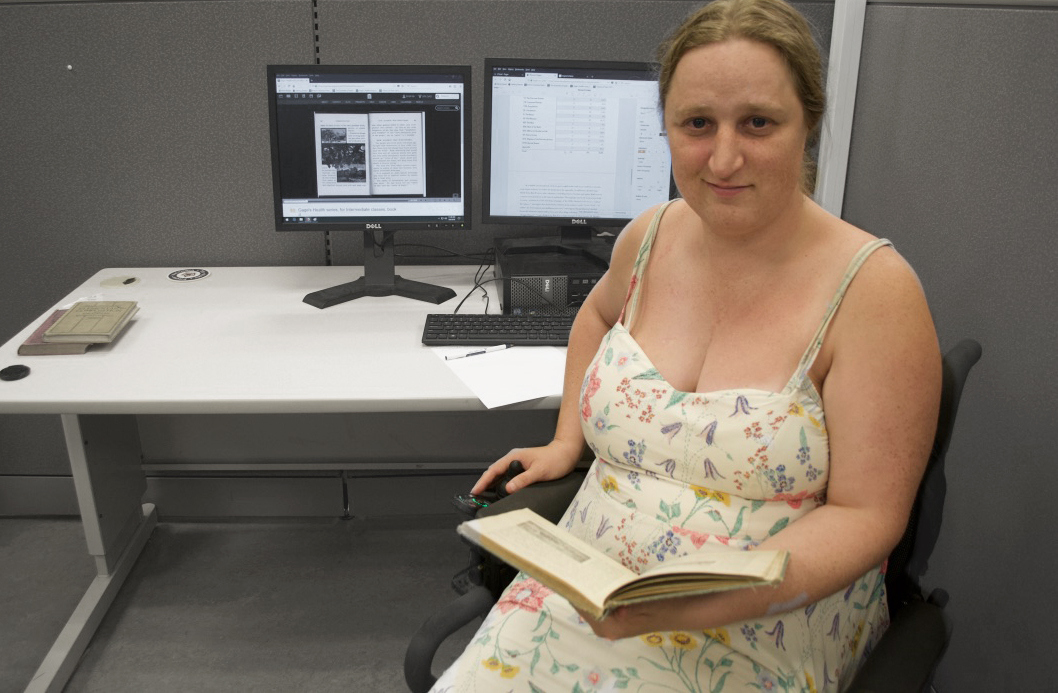
While most UVic students are familiar with the McPherson Library — as a study space, research resource, or quiet nap zone — some might not think of it as an active research body in its own right.
The B.C. Historical Textbooks Project, run by Education Librarian Pia Russell, is investigating the perspectives taught since the province joined Confederation in 1871. Some key areas of research are how they address Indigenous peoples and the role of women. The library’s reference collection consists of several hundred textbooks used in B.C. public schools.
One of the researchers involved in this project is Emily Stremel, a fifth year part-time History major at UVic who first started working on the project during a work-study placement in 2018. Her typical tasks include transcribing books and editing digital copies so that they’re easy to read, and soon she’ll start applying digital technology created by the Text Encoding Initiative to turn scanned copies into fully machine-readable documents. But Stremel also has the freedom to pursue her own interests, including researching disability history.
Stremel is currently investigating the role of two feminist organizations, the Women’s Christian Temperance Union and the Local Council of Women, in pushing the temperance movement into the school curriculum.
The temperance movement called for abstinence from alcohol and peaked during the latter half of the 1800s. Around that same time, there was a controversy about allowing women on B.C. school boards, which culminated in a brief period where it was actually illegal. The Local Council of Women, working with the Women’s Christian Temperance Union, campaigned to reverse this law and were also able to add temperance into school textbooks and syllabi.
Stremel’s research is based on an 1896 textbook called Gage’s Health Series for Intermediate Classes, which she describes as “temperance propaganda disguised as a physiology textbook.” Nearly a third of the textbook is about alcohol and temperance, although there’s a bit about tobacco and opium as well.
Stremel’s focus in this investigation is making connections between the textbook and the political activities of these two organizations. She is currently writing a paper that will soon be published in the online B.C. Historical Textbooks Project exhibit on the UVic libraries website.
I caught up with Stremel to get some insight into what her research entails. We sat down in the staff area on the library’s second floor, next to a cart of some of the textbooks she’s been working on, where she excitedly told me about her work, interests, and goals for the future.
The Martlet: So how did you get started doing your independent research project?
Stremel: It’s something that I was interested in. As an undergraduate, I’m studying history more broadly to get a solid foundation, to have the historical context for my interests. When I go into grad school, I plan on studying disability history. One particular interest of mine is the disability rights movement in the 20th century — but more broadly, I’m interested in how different societies throughout history have approached taking care of their disabled members of society. So, this book is connected to that in terms of how addiction is addressed, and how the temperance movement was one of the early movements that connected alcoholism to addiction.
What excites you about this work in particular?
Working as an undergraduate research assistant, it’s a really early opportunity to build my resume and build up to my career and will hopefully give me a leg up on people who start their research opportunities in grad school. How many people get to actually do research in their own area of interest this early in their career?
You mentioned getting started with this project during a work study term in Fall 2018, how have you progressed from then to now?
Working with Pia [Russell], we’ve definitely built a relationship where there’s a lot of synergy between our work now. So I’ve got a good sense of what Pia’s looking for, Pia’s got a good sense of what I’m interested in, and there’s a lot of overlap there too. We work really well together and a lot of the times, she leaves me free to find my own tasks to do which has been really great. It’s given me freedom to do my own work.
What do you like about doing research?
It’s something that keeps my focus. I really enjoy it, I enjoy learning, and research is, in a sense, it’s own puzzle. That’s something particularly about history that I love, and it’s why I take it, looking back and trying to sift through the different documents and books, finding those clues and trying to make conclusions about them, and making your argument. That’s all really fun to me, so I’m looking forward to a career in research.
Broadly, what do you think is the importance of doing historical-based research?
There’s of course the adage that if you don’t study history, you’re doomed to repeat it. History, we think that it’s about the past but it really is about the present. Because how we look at the past impacts how we look at the present. How we view the history behind a conflict is a determinant of how we address that conflict today.
Do you have any advice for undergraduate students wanting to get involved with research?
[They should] find an area that they’re interested in and talk to professors who do research in that area. If you really want to do research, put yourself out there. Find out what’s out there.
This interview has been edited for brevity and clarity.
Are there any exciting research projects on campus you think we should look into? Email edit@martlet.ca!






